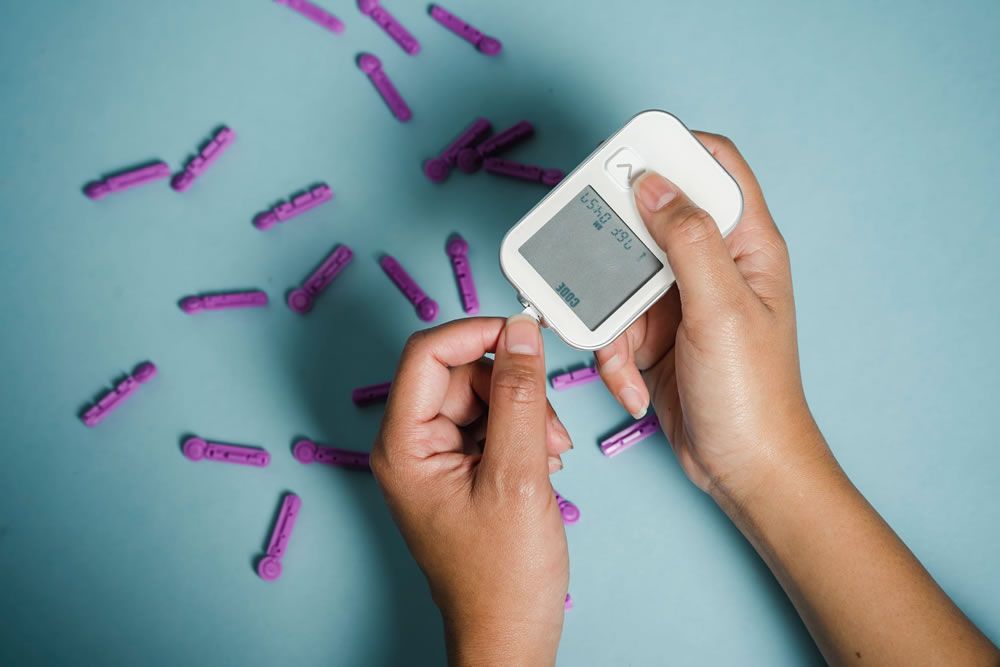靈氣對糖尿病有效嗎? Is Reiki Effective for Diabetes

關於靈氣和糖尿病
糖尿病是一種常見的嚴重疾病,影響著全世界數百萬人。 事實上,根據世界衛生組織的數據,2014 年地球上約有 4.22 億人患有糖尿病,而且這個數字還在逐年增加。 糖尿病有多種治療方法,但這種情況繼續給世界各地的人們帶來問題,而且隨著時間的推移往往會使病情惡化。 幸運的是,最近的研究表明靈氣可能對患有這種疾病的人有所幫助。
什麼是糖尿病?
糖尿病是當胰腺停止產生足夠量的胰島素或身體無法有效使用產生的胰島素進行熱量代謝時發生的一種情況。 這會迫使血液中的糖含量增加,從而對身體的器官系統造成損害。
如果不加以控制,糖尿病會導致許多嚴重的併發症和不良反應。
具體來說,患有糖尿病的人可能會經歷:
.提升了心臟病發作和中風的風險。
.腎功能衰竭。
.眼睛受損,可能導致失明。
.循環問題。
.神經損傷。
.感染風險增加。
為了控制糖尿病,醫學專家推薦了多種策略。 鼓勵大多數糖尿病患者定期檢查血糖並記錄其波動情況。 糖尿病患者也可服用口服藥物、注射藥物和/或胰島素。 此外,糖尿病患者可能會受益於飲食的改變以及定期運動與鍛煉。
靈氣如何幫助?靈氣對糖尿病有效嗎?
靈氣是一種基於能量流治療概念並起源於日本的療法。 執行靈氣的練習者以觸摸和特定的手部位置來促進客戶身體的能量流動,清理能量阻塞並促進身體的自然癒合反應。 這種治療背後的信念是,身體的不適和疾病是體內能量通路受阻或紊亂的結果。 靈氣的目標是恢復這些通路的正常能量流動,從而幫助改善客戶的身體狀況。
在靈氣治療期間,靈氣從業者將雙手放在特定位置並輕輕接觸客戶。 或者,從業者也可以將他或她的手放在客戶上方幾英寸處。 練習者可以在治療期間最多改變他或她的手的位置 15 次,治療時每個位置最多保持 5 分鐘。
對於糖尿病患者,靈氣療法可能會在以下方面有所幫助:
.減輕壓力
.人體處於高壓力水平通常會導致血糖失衡。 所以靈氣可能有助於降低壓力水平,這也有助於降低客戶的血糖。
靈氣創造一種放鬆的狀態,從而提高睡眠質量。
改善睡眠
不良的睡眠習慣可能會加劇糖尿病的症狀。 靈氣通過創造放鬆狀態來解決這個問題,從而提高睡眠質量。
緩解抑鬱症
靈氣可以改善客戶的情緒並緩解抑鬱症狀。 有了更好的人生觀,個案更有可能做出健康的決定,並遵守醫生對於管理他或她的症狀的醫囑。 此外,情緒的提升可能有助於身體自行維持正常的血糖水平。
減少疼痛感
已經確診的糖尿病患者經常會經歷與神經病變相關的疼痛。 靈氣療法可能有助於降低疼痛的敏感性,讓客戶緩解這些不舒服的症狀。
靈氣是非侵入性的,幾乎不會產生副作用,使其成為任何糖尿病患者的安全選擇。
糖尿病靈氣相關研究
專注於靈氣及其對各種條件的影響的研究正在進行中。然而,一些研究已經探討了靈氣與糖尿病之間的關係。
其中一些研究詳述如下。
靈氣治療糖尿病神經病變的有效性
2007 年發表在 Diabetes Care 上的一項研究表明,靈氣可以有效治療與糖尿病神經病變相關的疼痛。本研究中的患者分為三組:一組未接受治療,一組接受模仿靈氣的治療,另一組接受真正的靈氣治療。接受真正靈氣治療的患者的疼痛水平有顯著改善,而其他組患者的疼痛水平僅略有改善或根本沒有改善。這些結果表示靈氣可能對患有糖尿病相關疼痛的患者有幫助。
靈氣能有效作用於焦慮上
發表在《疼痛管理護理》上的一項確定靈氣是否可以有效治療焦慮症的研究分析。研究中的綜述發現,大多數研究結果表示,接受靈氣治療的個體的焦慮症狀在統計學上有顯著改善。
基於這些結果,靈氣可以減少參與治療的個體(包括糖尿病患者)的焦慮是有道理的。這種焦慮的減少可以防止與壓力相關的血糖升高。它還可能通過改善糖尿病患者的情緒間接影響糖尿病,從而使他們更積極地管理疾病。
靈氣治療糖尿病有效性的研究正在進行中,但該領域的專業人士對此持樂觀態度。事實上,美國糖尿病協會發表的一篇文章表示,使用靈氣和其他基於能量的治療技術治療糖尿病的潛力很大。這些療法的副作用很少,而且其益處已得到許多研究的支持。
關鍵字:靈氣研究, 糖尿病特徵, 糖尿病症狀診斷, 糖尿病症狀診斷, 糖尿病指數, 糖尿病風險
延伸閱讀:
Is Reiki Effective for Diabetes
About Reiki and Diabetes
Diabetes is a common but serious illness that affects millions of people throughout the world. In fact, according to the World Health Organization, approximately 422 million people on the planet were suffering from diabetes in 2014, and the number is increasing every year. A number of treatments exist for diabetes, but the condition continues to cause problems for people everywhere, often worsening over time. Fortunately, recent research has shown that Reiki may be beneficial to individuals struggling with this condition.
What is Diabetes?
Diabetes is a condition that occurs when the pancreas stops producing adequate amounts of insulin or when the body becomes unable to use the insulin produced effectively. This forces the amount of sugar in the blood to increase, which causes damage to the body’s organ systems.
Left unchecked, diabetes can lead to many serious complications and adverse effects.
Specifically, people who suffer from diabetes may experience:
A higher risk of heart attack and stroke.
Kidney failure.
Damage to the eyes, which may lead to blindness.
Circulation problems.
Nerve damage.
An increased risk of infection.
To control diabetes, medical professionals recommend a variety of strategies. Most people with diabetes are encouraged to check their blood sugar on a regular basis and keep a record of fluctuations. People with diabetes may also take oral medications, injectable medications, and/or insulin. In addition, diabetes patients may benefit from changes to their diet, as well as regular exercise.
How Can Reiki Help?
Is Reiki Effective for Diabetes?
Reiki is a Japanese origin therapy based on the concept of energy flow. A practitioner performing Reiki uses touch and specific hand positions to encourage the flow of the client’s energy, dissolving energy blockages and facilitating the body’s natural healing response. The belief behind this treatment is that discomfort and illness are the results of blocked or disturbed energy pathways within the body. The goal of Reiki is to restore normal flow to these pathways, thus assisting in improving the client’s physical condition.
During a Reiki session, a practitioner places both of his or her hands in specific positions and touches the client lightly. Alternatively, the practitioner may also hold his or her hands a few inches above the client. The practitioner may change the position of his or her hands up to 15 times during the session, holding each position for up to five minutes.
For an individual with diabetes, Reiki treatments may help in the following ways:
Reduction of stress
High-stress levels often lead to blood sugar imbalances. Reiki may help to lower stress levels, which could help to lower the client’s blood sugar as well.
Reiki creates a relaxed state thus improving the quality of sleep.
Improved sleep
Poor sleep habits may exacerbate the symptoms of diabetes. Reiki combats this problem by creating a relaxed state thus improving the quality of sleep.
Alleviation of depression
Reiki may improve the mood of the client and relieve the symptoms of depression. With a better outlook on life, the client is more likely to make healthy decisions and adhere to the doctor’s instructions regarding the management of his or her symptoms. In addition, the elevation of the mood may aid the body as it tries to maintain normal blood sugar levels on its own.
Reduced pain sensations
People with diabetes that has progressed often experience pain related to neuropathy. Reiki treatments may help to reduce pain sensitivity, providing clients with relief from these uncomfortable symptoms.
Reiki is non-invasive and causes virtually no side effects, making it a safe choice for any individual with diabetes.
Relevant Research Regarding Reiki for Diabetes
Research focusing on Reiki and its effects on various conditions is ongoing. However, some studies have already explored the relationship between Reiki and diabetes.
Some of these studies are detailed below.
Effectiveness of Reiki for Diabetic Neuropathy
A study published in Diabetes Care in 2007 demonstrated that Reiki could be an effective treatment for the pain related to diabetic neuropathy. Patients in this study were divided into three groups: one that received no treatment, one that received a treatment that mimicked Reiki, and one that received true Reiki. Pain levels for patients in the group receiving true Reiki treatments improved considerably, while pain levels among patients in the other groups improved only slightly or not at all. These results indicate that Reiki may be beneficial to patients who have pain related to diabetes.
Reiki’s Effect is Effective for Anxiety
An analysis published in Pain Management Nursing evaluated multiple studies designed to determine if Reiki could be an effective treatment for anxiety. This review found that the majority of studies performed showed a statistically significant improvement of anxiety symptoms among individuals who received Reiki treatments.
Based on these results, it stands to reason that Reiki may reduce anxiety among individuals who engage in treatment, including those with diabetes. This reduction in anxiety prevents stress-related increases in blood sugar. It may also indirectly affect diabetes by improving the mood of diabetic patients, which in turn causes them to be more proactive in the management of their disease.
Research on the effectiveness of Reiki in the treatment of diabetes is ongoing, but professionals in the field are optimistic. In fact, an article published by the American Diabetes Association expressed that the potential for the use of Reiki and other energy-based healing techniques for diabetes is great. These therapies have very few side effects, and the benefits have been supported by research.
